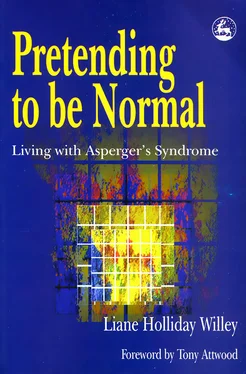Liane Holliday Willey - Pretending to be Normal
Здесь есть возможность читать онлайн «Liane Holliday Willey - Pretending to be Normal» весь текст электронной книги совершенно бесплатно (целиком полную версию без сокращений). В некоторых случаях можно слушать аудио, скачать через торрент в формате fb2 и присутствует краткое содержание. Город: London, Год выпуска: 2000, ISBN: 2000, Издательство: Jessika Kingsley Publishers, Жанр: Психология, Биографии и Мемуары, на английском языке. Описание произведения, (предисловие) а так же отзывы посетителей доступны на портале библиотеки ЛибКат.
- Название:Pretending to be Normal
- Автор:
- Издательство:Jessika Kingsley Publishers
- Жанр:
- Год:2000
- Город:London
- ISBN:1 85302 577 1
- Рейтинг книги:4 / 5. Голосов: 1
-
Избранное:Добавить в избранное
- Отзывы:
-
Ваша оценка:
- 80
- 1
- 2
- 3
- 4
- 5
Pretending to be Normal: краткое содержание, описание и аннотация
Предлагаем к чтению аннотацию, описание, краткое содержание или предисловие (зависит от того, что написал сам автор книги «Pretending to be Normal»). Если вы не нашли необходимую информацию о книге — напишите в комментариях, мы постараемся отыскать её.
Pretending to be Normal — читать онлайн бесплатно полную книгу (весь текст) целиком
Ниже представлен текст книги, разбитый по страницам. Система сохранения места последней прочитанной страницы, позволяет с удобством читать онлайн бесплатно книгу «Pretending to be Normal», без необходимости каждый раз заново искать на чём Вы остановились. Поставьте закладку, и сможете в любой момент перейти на страницу, на которой закончили чтение.
Интервал:
Закладка:
I tried as hard as I could to keep up with the other swimmers. I arrived to practice earlier and left later, but I was not capable of teaching myself what I needed to learn. I went to a few meets with the team, but I never understood the social aspects of the group’s dynamics. I sat alone at the meets, watching the clock until it was time to leave. I do not think anyone missed me when I quit the team. I cannot say I missed them either. What I missed was the water.
I dream sometimes that I had been coached by someone who was more sensitive to individual needs, someone who would have recognized my coordination problems as more than an example of a child who simply was not an athlete. At the very least, I wish someone had helped me more. But high school was in some ways a survival of the fittest. Only those students with extreme special needs were typically identified and assisted. Everyone else was left to find their own way. After I faced the fact that I would not be a winning swimmer, I found my way to the marching band’s drill team, but not as a musician. I was a pep squad dancer. What a ridiculous choice for me to have made. How could I not have known that the same bilateral problems which kept me from being a good swimmer would also keep me from becoming a good cheerleader?
When we practiced for dance performances, it was common for one of the captains of our squad to face the rest of us while she showed us our routine. I do not know how they managed, but it seemed like everyone but me could tell their body to move in the opposite direction of what they were seeing, so that if the captain moved her left arm, they did too. I did not. When someone facing me moved their left arm, I moved my right arm. When they moved their right arm, I moved my left arm and so on and so forth. I knew all along that I was making a mistake, but no matter what I did and no matter how many times I told myself things like «her right arm equals my left arm», I could not transfer the knowledge to the movement. After a few weeks of bilateral torture, I figured out I might find some success if I practiced our dance steps from the back row; a vantage point that allowed me to carbon copy the people who were facing the same direction I was. Eventually, after hours and hours of practice, I could make myself perform the dance steps with some degree of proficiency, if there was someone in front of me to give me cues. Of course, this was not the only talent a dancer needed. Part one was memorizing the steps to the routine, part two was synchronizing them to music. Part one was a breeze compared to part two. I was always offbeat, always the girl begging to stay in the last row even though I was not the tallest, and I was always the girl who tripped.
I never mastered the aptitude of dance in high school, for precisely the same reasons I never mastered the step and dance aerobic classes that came into popularity after I was out of high school. The difference was, by the time I reached adulthood, I knew the odds were against me being able to do anything that took coordination. I did not recognize how deeply rooted my simple dexterity problems were when I was still a teen. But maybe that was for the better. I would not have tried half the things I did, if someone or something had told me I was bound for failure. I think it was a good thing I was too egocentric to think along those terms. As it happened, I eventually found success in an activity that charmed, interested and fulfilled me. I found the speech and dramatic arts club.
I think cultural and performing arts types must be Aspies. If not, they are surely the next best thing. They are at least amenable friends of Aspies. I found great acceptance among my drama peers, most of whom were extremely tolerant and appreciative of diversities and personal visions. I was able to flourish in such a warm and supportive environment, finding it to be the best place for me to turn many of my AS traits into real and viable assets. In those classes I was inspired by other eccentric thinkers who taught me to think of language as more than a means for expressing simple needs. Finally, I had found a natural place for me to be.
Linguistics and the act of speaking itself, have always been amongst my keenest interests, but I did not become immersed in the treasures they awarded until I studied them in high school. Words, and everything about them, hold my concentration like nothing else. On my over-stuffed bookshelf sit several thesauruses, a half dozen dictionaries, famous quotations books, and a handful of personal reflection journals. Language appeals to me because it lends itself to rules and precision even more often than it does to subjectivity. Put together in the right sequence, taking into account things like tone, perspective, implications and intent, a writer can tweak and bend words until they say precisely what they should. I am fascinated with the opportunities words provide. I love everything about them, especially the power they yield. Some words can please my eyes, given they have the symmetry of line and shape I favor. Other words can fascinate me by the melodies they sing when they are spoken. Properly handled — with care most of the time — words can work miracles on my sensibilities and on my understanding of the world, because each one has its own personality and nuance and its own lesson to teach.
Sometimes, the care I give to words can throw me into an obsessive compulsive ritual. I typically end up spending far too much time selecting which word to use and too much time reworking a sentence so that it looks and feels and sounds right. This all translates into a fixation that can grind my thought process to a halt. When I get like this, I cannot concentrate on anything else, not a thing, until I have found the perfect term or phrase I need. This tendency can make my experiences with the written word tedious, at least in terms of time and other missed opportunities, but never meaningless or futile.
Fine things happened when I mixed my voice with the monologues and original oratories I wrote. I would play with my voice, working it, pushing it to reach new tones and pitch, different volumes and a myriad of rhythms. I enjoyed the feeling my voice left on my ear, the way it resonated in my throat and the sensation it created as it slipped past my lips. My voice did as much as my thoughts to choose the words I would put in my work. I would search long and hard to find words that tickled, words that had smooth textures, and words that warmed when I spoke them. I knew I had written something great when I found words that looked, sounded and felt good. And when I knew I had something great, I performed well enough to routinely finish in the top five per cent of the competition.
Even though my public speaking competition days are behind me, I still work my voice, albeit in a different fashion. I have developed a habit of mimicking other peoples speech, especially if their voice has heavy nasal or high shrill qualities, or extreme eastern or southern accents. I find I have to mimic these voices, otherwise they sting my ears like a wet towel slapped against my eardrum would. When I mimic agitating voices, I can play and replay them until I manage to edit them into a medley I can appreciate and value.
Most of my public speaking fell under a category called radio and television. Basically, I would sit behind a microphone and read news copy I had written, to a panel of judges. When I competed in this context, I usually won or finished in second place. There is no question that this was my favorite thing to do, but I also liked performances that challenged my nonverbal expressions and my body posture. It was great fun to think of myself as a doll I could bring to life. I enjoyed methodically planning how I could make a script or poem more meaningful with facial expressions and eye contact and the wave of a hand or the shift of my weight. It was like a puzzle I could piece together. Little did I realize it was also a wonderful way for me inadvertently to learn how to use my nonverbal communication skills when I was not presenting a piece of literature. I was coming to understand that words on paper sometimes had to scream to be heard, but that words spoken with a distinct voice and compelling expressions could whisper, for the combination was that powerful.
Читать дальшеИнтервал:
Закладка:
Похожие книги на «Pretending to be Normal»
Представляем Вашему вниманию похожие книги на «Pretending to be Normal» списком для выбора. Мы отобрали схожую по названию и смыслу литературу в надежде предоставить читателям больше вариантов отыскать новые, интересные, ещё непрочитанные произведения.
Обсуждение, отзывы о книге «Pretending to be Normal» и просто собственные мнения читателей. Оставьте ваши комментарии, напишите, что Вы думаете о произведении, его смысле или главных героях. Укажите что конкретно понравилось, а что нет, и почему Вы так считаете.












